Tuesday, November 30, 2010
Monday, November 29, 2010
Poor Man's Hitchcock
Hi, Mom! (1970) - De Palma
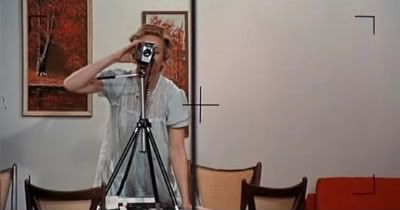
Brian De Palma's take on fame and upper class in the backdrop of sleazy New York in the 70s is hilarious romp. Young De Niro plays Jon, an aspiring pornographer pitching his idea for peeping with a long lens on the inhabitants of a highrise across the street. He then takes advantage of a ditsy lonely girl after spying on her for a while. Then there is a experimental theater group doing an interactive piece called 'Be Black Baby' where well intentioned rich white patrons go through some horrendous ordeal- putting on black faces and getting physically assaulted, only to rave it as life-changing experience.
Maniacally spastic and energetic in its playfulness, this might be my favorite De Palma.

Brian De Palma's take on fame and upper class in the backdrop of sleazy New York in the 70s is hilarious romp. Young De Niro plays Jon, an aspiring pornographer pitching his idea for peeping with a long lens on the inhabitants of a highrise across the street. He then takes advantage of a ditsy lonely girl after spying on her for a while. Then there is a experimental theater group doing an interactive piece called 'Be Black Baby' where well intentioned rich white patrons go through some horrendous ordeal- putting on black faces and getting physically assaulted, only to rave it as life-changing experience.
Maniacally spastic and energetic in its playfulness, this might be my favorite De Palma.
All Dogs Go To Heaven
Plague Dogs (1982) - Rosen
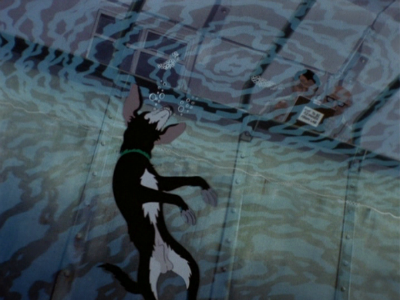
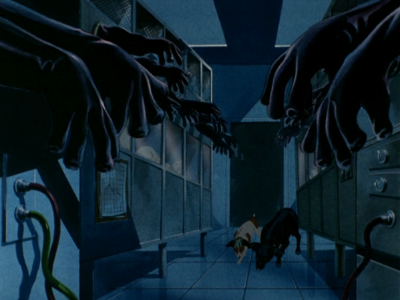
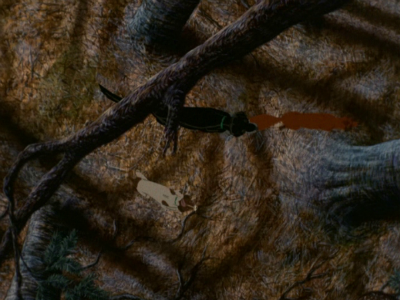
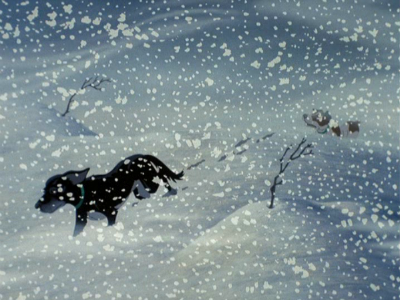
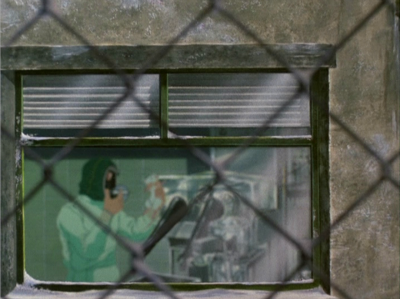
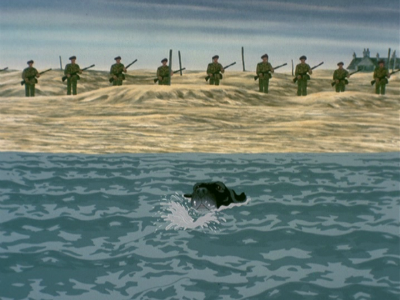
A black retriever named Rowf and a fox terrier, Snitter escape from a top secret laboratory in a mountainous English town by the lake. After many water endurance test where many fellow lab dogs drown, Rowf has issues with water. Snitter has been subjected to brain surgery and has a hole in his skull and also has a lousy luck with humans (his masters die). To avoid starvation, they stalk sheep with the help of a snarky fox named Todd. The body count rises. The towns people are after them, the labcoats are after them. Soon the Defense Ministry is called in with paratroopers to smoke the dogs out and destroy them for fear of them carrying bubonic plague.
No less devastating than Rosen's Watership Down, Plague Dogs is nevertheless beautifully drawn animation with a strong anti-animal lab testing message. The ending will break your heart.






A black retriever named Rowf and a fox terrier, Snitter escape from a top secret laboratory in a mountainous English town by the lake. After many water endurance test where many fellow lab dogs drown, Rowf has issues with water. Snitter has been subjected to brain surgery and has a hole in his skull and also has a lousy luck with humans (his masters die). To avoid starvation, they stalk sheep with the help of a snarky fox named Todd. The body count rises. The towns people are after them, the labcoats are after them. Soon the Defense Ministry is called in with paratroopers to smoke the dogs out and destroy them for fear of them carrying bubonic plague.
No less devastating than Rosen's Watership Down, Plague Dogs is nevertheless beautifully drawn animation with a strong anti-animal lab testing message. The ending will break your heart.
The Lamest. Motorcycle Gang. Ever.
Psychomania (1973) - Sharp
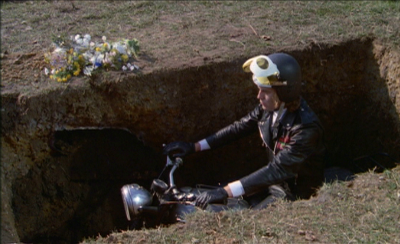
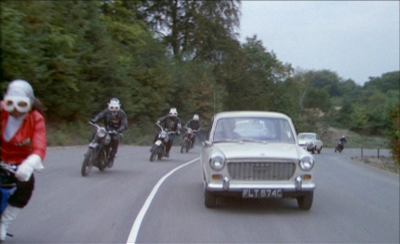
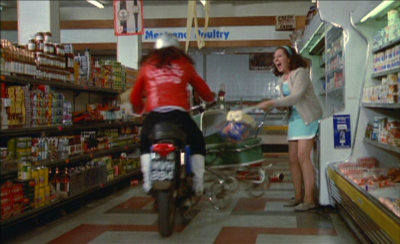
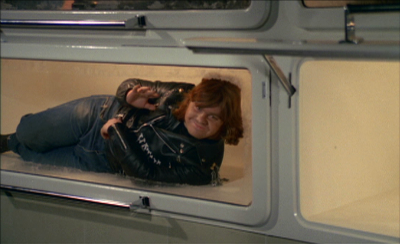
The devil (frog god) worshiping motorcycle gang, 'The Living Dead' roams the English countryside, wrecking bloodless, Monty Python skit resembling havoc- cruising through supermarket and terrorizing old ladies by ripping off sideview mirrors and breaking windshieldsof their cars. Their leader, a suave young man believes, with the approval from his ghost channeling medium mother, that they will come back as invincible after they kill themselves. All the members follow his suit in very comical ways and leaving dry corpses everywhere (they just fall down), but our heroine Abby is still undecided because she loves life!
Not hokey enough to be a cult classic and bike stunts are pretty lame. There is a disclaimer about the film's original negative being lost that they had to transfer from 'the best available sources'. Picture quality wasn't too bad though. And the film is chuckleworthy.




The devil (frog god) worshiping motorcycle gang, 'The Living Dead' roams the English countryside, wrecking bloodless, Monty Python skit resembling havoc- cruising through supermarket and terrorizing old ladies by ripping off sideview mirrors and breaking windshieldsof their cars. Their leader, a suave young man believes, with the approval from his ghost channeling medium mother, that they will come back as invincible after they kill themselves. All the members follow his suit in very comical ways and leaving dry corpses everywhere (they just fall down), but our heroine Abby is still undecided because she loves life!
Not hokey enough to be a cult classic and bike stunts are pretty lame. There is a disclaimer about the film's original negative being lost that they had to transfer from 'the best available sources'. Picture quality wasn't too bad though. And the film is chuckleworthy.
Monday, November 22, 2010
Tony Chestnut (see the movie to get the joke!)
Mumsy, Nanny, Sonny and Girly (1970) - Francis
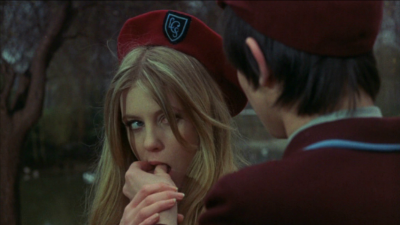
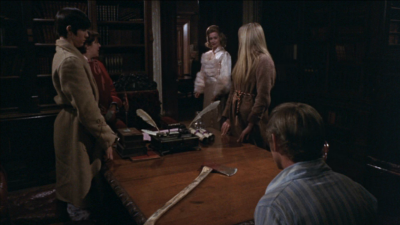
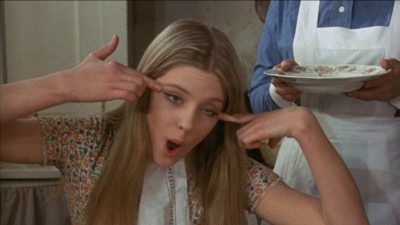
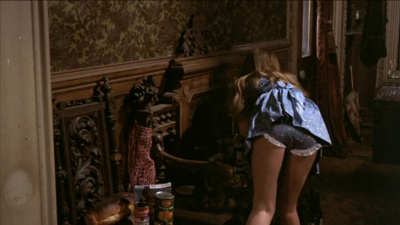
The children, Sonny and Girly dressed in English school uniforms find homeless people in the park and bring them home, to Mumsy and Nanny, to make them family playmates. When their playmates break the rules, they send them to the angels. This nursery rhyme filled, giggly family slowly disintegrates when they bring home a new feisty friend.
Part Teorema and part Wicker Man, Mumsy and Co, features some of the most delicious dialog and bewitching Vanessa Howard as Girly who can sing Siamese National Anthem. Another great Brit class satire borne out of the clash of the traditional family values of the war generation and 60s free love/anti anything generation. Great fun.




The children, Sonny and Girly dressed in English school uniforms find homeless people in the park and bring them home, to Mumsy and Nanny, to make them family playmates. When their playmates break the rules, they send them to the angels. This nursery rhyme filled, giggly family slowly disintegrates when they bring home a new feisty friend.
Part Teorema and part Wicker Man, Mumsy and Co, features some of the most delicious dialog and bewitching Vanessa Howard as Girly who can sing Siamese National Anthem. Another great Brit class satire borne out of the clash of the traditional family values of the war generation and 60s free love/anti anything generation. Great fun.
Wednesday, November 17, 2010
Ideal vs. Normal Relationship
Alle Anderen/Everyone Else (2009) - Ade
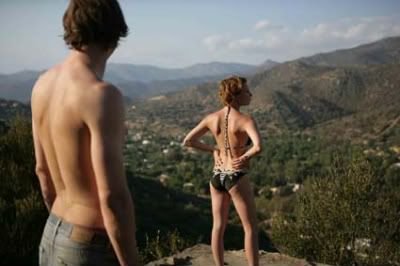
A young, not unattractive professional German couple, Chris (Lars Eidinger)- an architect, Gitti (Birgit Minichmayr), a music promoter, is vacationing in Sunny, picturesque (but testy) Sardinia. Chris is somewhat timid and full of self doubt, Gitti more assertive but needy. Ups and downs and tensions between them are pretty obvious, so as their physical intimacy. It becomes apparent that their relationship is not quite typical/ideal when they run into Chris's successful macho colleague and his nice pregnant wife. Things go a little volatile, as their unconventional (in other words, real) relationship gets tested. Simple in its aesthetics (heavily dependent upon two leads' actings) and brutally honest in its depiction, this 'relationship drama' rings very true to me. Very refreshing.

A young, not unattractive professional German couple, Chris (Lars Eidinger)- an architect, Gitti (Birgit Minichmayr), a music promoter, is vacationing in Sunny, picturesque (but testy) Sardinia. Chris is somewhat timid and full of self doubt, Gitti more assertive but needy. Ups and downs and tensions between them are pretty obvious, so as their physical intimacy. It becomes apparent that their relationship is not quite typical/ideal when they run into Chris's successful macho colleague and his nice pregnant wife. Things go a little volatile, as their unconventional (in other words, real) relationship gets tested. Simple in its aesthetics (heavily dependent upon two leads' actings) and brutally honest in its depiction, this 'relationship drama' rings very true to me. Very refreshing.
Sunday, November 14, 2010
Hope Down South
South of the Border (2009) - Stone
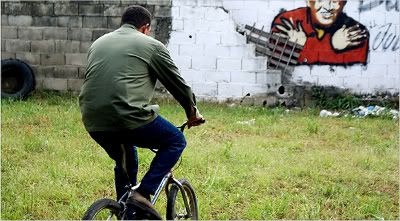
Oliver Stone tours Venezuela, Bolivia, Argentina, Paraguay, Brazil, Ecuador and Cuba, hobnobbing with 'evil' dictators- playing soccer with Morales in Bolivia, cracking a sexist joke at Kirchner in Argentina, etc. This is by far the best Stone film I've seen. He narrates the film but the narration and his presence are very unobtrusive. The film lays out these countries' tumultuous histories. South America, after years of American imperialism and devastating measures from IMF, is finally getting back on its feet and there seems to be genuine solidarity. Curiously Nicaragua is missing from Stone's itinerary.
Since the US is not a superpower anymore and still tangled in the Middle East, is there a hope for Africa?

Oliver Stone tours Venezuela, Bolivia, Argentina, Paraguay, Brazil, Ecuador and Cuba, hobnobbing with 'evil' dictators- playing soccer with Morales in Bolivia, cracking a sexist joke at Kirchner in Argentina, etc. This is by far the best Stone film I've seen. He narrates the film but the narration and his presence are very unobtrusive. The film lays out these countries' tumultuous histories. South America, after years of American imperialism and devastating measures from IMF, is finally getting back on its feet and there seems to be genuine solidarity. Curiously Nicaragua is missing from Stone's itinerary.
Since the US is not a superpower anymore and still tangled in the Middle East, is there a hope for Africa?
Thursday, November 11, 2010
20 Minutes of Bliss: Claire Denis Interview

Whether it's about a disco dancing French legionnaire, underworld organ trafficking or vampires, Claire Denis's enigmatic films have been enrapturing cinephiles around the world since her debut feature Chocolat (1988). With her thrilling new film White Material opening statewide on November 19th, and the retrospective- No Fear: The Films of Claire Denis at IFC starting this week, I sat down with Denis for a brief interview. She was very personable and gracious, offering long and thoughtful responses.
It's been 22 years since Chocolat and more than 10 years since Beau Travail, what prompted you to shoot a film in Africa again?
A while ago, Isabelle (Huppert) mentioned if I would be interested in adapting Doris Lessing's book The Grass is Singing. The book is set in South Africa right after the WWII. It's about Lessing's British ex-pat parents trying their hands in farming which they were terrible at. But even though it's a great book, there were two reasons why I didn't want to do it. First, the book already had a big influence on me making Chocolat. Secondly, I didn't want to do a period film. I don't like the typical nostalgic notion of colonial era- beautiful landscapes, exotic animals, heat, et cetera. I also didn't think it would be fair to show a colonial South Africa after all they've been through- 50 years of apartheid and election of the president Mandela and all. I wanted to make a film about 'now'.
White Material seems like a whole another world though. It feels timeless, not attached to any time period.
But it's not the 30s anymore. Surely you noticed the Chinese motorbike! (laughs). Those motorbikes are everywhere in Cameroon. Then there are those old beat up trucks, but it's mainly because they are poor. I would say the film is set somewhere in the last 10 years or so.
Has it changed a lot since Chocolat, shooting in Cameroon?
Yes. I think it's modern in a way other parts of Africa are modernized. But in rural farming areas, in French countryside even, everyday life is not so easy. It's not because the modernity is coming slowly, but because of the economical hardships. When I was making Chocolat, we were pretty much blind to the economic crises in Africa. Now we all live in the global recession, we see the blow is twice as hard there.
The famed French author Marie Ndiaye co-wrote the script with you. Can you tell me the process?
I've been admiring her work since her very first book (*Quant au Riche Avenir, written when she was only 17). We've been corresponding for a while because we both were intrigued by each other's work. When Isabelle told me about the project, naturally I contacted Marie. We took a trip to a coffee plantation in Ghana together to see what it's like. Since she had never written a film script before, she didn't have any bad inhibition that comes with the pitfalls of bad scriptwriting. She was very open. It was great.
The White Material seems much more narrative driven than your previous films. Do you feel that way?
Yes. After The Intruder (2004), I was driven by the idea of doing something not too mysterious but more concrete. Both this film and 35 Shots of Rum are very straightforward. The idea of heart transplant in The Intruder was both naïve and abstract in a way. Just like the old man in the film, it made me think of my own mortality. Then during editing that film, my producer (Humbert Balsan) died. I actually thought that it would be my last film and I would die myself. I wasn't afraid, but I felt that I'd never be able to make a film like that twice. It was a real turning point for me.
Wow, I didn't know about that.
But I'm sure it's not uncommon that other filmmakers feel like that too sometimes, that the film they are making right now would be their last. It was Isabelle and others who encouraged me to make films again. I did dedicate 35 Shots of Rum to Humbert.
One thing that struck me in the White Material was the son character, Manuel (played memorably by Nicolas Duvauchelle). He is a country-less product of the white colonialists who are losing power. He's described as 'half baked'. Tell me if I'm reading it too deep, but is there a parallel between Manuel and recent violent upheaval in French society?
Oh no. For me and Marie, it was much more concrete and simple. As a mother you don't want your son to be 'soft'. I was like that when I was that age. I would've rather laid on the couch and sleep all day. I think it's more conventional 'mother wanting her son to be a man'.
White Material Review
Chocolat Review
Interview at twitch
The Retrospective- No Fear: Films of Claire Denis at IFC Center runs November 10th - 18th
White Material opens limited in the U.S. this Friday, the 19th, with more cities to follow
Wednesday, November 10, 2010
Post-College Blues
Tiny Furniture (2010) - Dunham
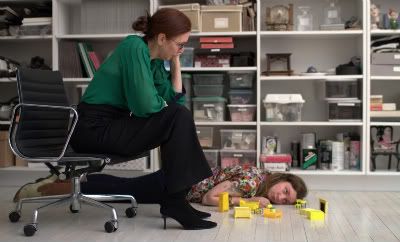
Winner of this year's SXSW Jury Award, at a glance, Tiny Furniture could fit neatly into the typical post-college subgenre that has been a staple in American indies for the last two decades, except it doesn't. Thanks to director/actor Lena Dunham.
Aura(Lena Dunham), a recent graduate from some liberal art college in Midwest with her useless film theory degree and a dying hamster comes back home, to the Manhattan loft, inhabited by her successful photo artist mother Siri (Laurie Simmons, Dunham's real mom) and her high school prodigy, prettier sister Nadine (Grace Dunham, her real sister). Only thing she has to show for her college education is a youtube clip of herself in an unflattering performance art (she already has 375 hits on it!). She is completely stumped at life after college with no job prospects, no ambition and no boyfriend. Only thing that is left for Aura to do is to overstay her welcome in the house and get into trouble.
Even though it has all the slacker genre trappings- affluent white family, sibling rivalry, obligated party scenes, snappy one-liners, Tiny Furniture rises above all the pre-conceived notion of being just another white privileged college kid movie. It's Dunham's guileless characterization of Aura that comes off as real, funny and endearing.
Tightly executed on Canon 7D in controlled static shots by a talented cinematographer Jody Lipes (Afterschool, Wild Combination and director of NY Export: Opus Jazz), the movie fortunately lacks any hand-held camera movement or meandering shots usually associated with indie HD filmmaking.
With Dunham's acute observation and embodiment of romantic humiliation and post-college confusion, Tiny Furniture is an intriguing mixture of autobiographical filmmaking and performance art. I'm looking forward to see what she will come up with next.
Review at twitch

Winner of this year's SXSW Jury Award, at a glance, Tiny Furniture could fit neatly into the typical post-college subgenre that has been a staple in American indies for the last two decades, except it doesn't. Thanks to director/actor Lena Dunham.
Aura(Lena Dunham), a recent graduate from some liberal art college in Midwest with her useless film theory degree and a dying hamster comes back home, to the Manhattan loft, inhabited by her successful photo artist mother Siri (Laurie Simmons, Dunham's real mom) and her high school prodigy, prettier sister Nadine (Grace Dunham, her real sister). Only thing she has to show for her college education is a youtube clip of herself in an unflattering performance art (she already has 375 hits on it!). She is completely stumped at life after college with no job prospects, no ambition and no boyfriend. Only thing that is left for Aura to do is to overstay her welcome in the house and get into trouble.
Even though it has all the slacker genre trappings- affluent white family, sibling rivalry, obligated party scenes, snappy one-liners, Tiny Furniture rises above all the pre-conceived notion of being just another white privileged college kid movie. It's Dunham's guileless characterization of Aura that comes off as real, funny and endearing.
Tightly executed on Canon 7D in controlled static shots by a talented cinematographer Jody Lipes (Afterschool, Wild Combination and director of NY Export: Opus Jazz), the movie fortunately lacks any hand-held camera movement or meandering shots usually associated with indie HD filmmaking.
With Dunham's acute observation and embodiment of romantic humiliation and post-college confusion, Tiny Furniture is an intriguing mixture of autobiographical filmmaking and performance art. I'm looking forward to see what she will come up with next.
Review at twitch
Subscribe to:
Posts (Atom)